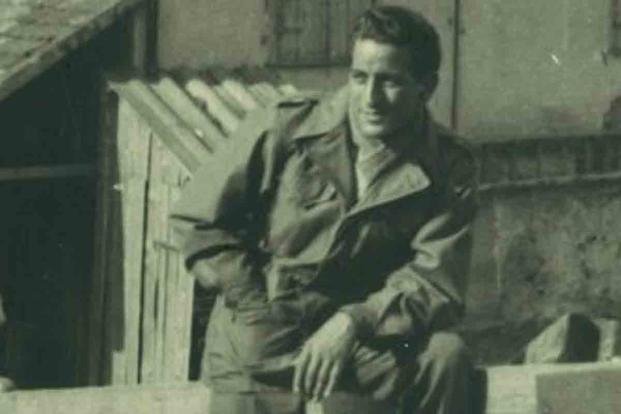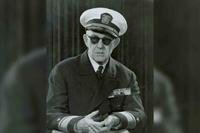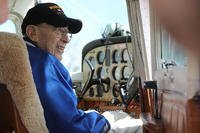Singer Tony Bennett's stint in the U.S. Army during World War II led him to legendary entertainer Bob Hope, which inspired him to pursue a career spanning more than seven decades. Only after he announced he was suffering from Alzheimer's disease in 2021 did the crooner retire from performing live shows.
He continued to rehearse his repertoire, however, and broke the Guinness World Record for the oldest person to release an album of new material, at age 95. It was just one more honor earned by a man who spent a lifetime receiving awards and accolades for his work. Bennett died on July 21, 2023, two weeks shy of his 97th birthday.
His experience in World War II not only shaped the rest of his life, it put infantry rifleman Anthony Dominick Benedetto in the spotlight as a member of Special Services, singing for the Allied troops in the trenches, sometimes literally.
"The main thing I got out of my military experience was the realization that I am completely opposed to war," Bennett wrote in his 1998 autobiography, "The Good Life." "Although I understand why this war was fought, it was a terrifying, demoralizing experience for me... life can never be the same once you've been through combat."
From the age of 15, young Tony watched as his friends and relatives were drafted into service. Bennett turned 18 in the summer of 1944, and that November, he received a draft notice of his own. He was sent to the Army, completed basic training at Fort Dix, New Jersey, and became an infantry rifleman at Fort Robinson, Arkansas.
After his post-training furlough, he waited to hear about his next assignment. He was shipped to Le Havre, France, to become a replacement troop for units that suffered heavy casualties fighting the Germans in Europe. Bennett was sent to G Company, 7th Army, 63rd Infantry Division.

Bennett's group of replacements were taking over for casualties lost during the Battle of the Bulge. He recalled his batch being awakened at 4 a.m. by none other than Gen. George S. Patton himself, shouting: "Now listen up! Forget your mothers and everything else you've ever known! You're going up to the line."
The line was a terrifying place for all the replacements. Many, Bennett wrote, had no experience in combat and some had never fired a weapon. The idea was that more experienced soldiers would help instruct the replacements, but there was no time for that.
“Snow covered the ground and the front was a front-row seat in hell,” he wrote. “It was an absolutely terrifying spectacle.”
They quickly found themselves digging foxholes in the hard ground to protect themselves from German 88-millimeter artillery. During his first night on the line, Bennett was almost killed by shrapnel from a German 88. He learned the rules for the front line quickly: "Don't move."
"Most nights, we'd be awakened by the bombs that were going off around us," Bennett wrote. "On the front line, we'd see dead soldiers, dead horses and big craters in the ground where bombs had exploded. To me, it's a joke that they make 'horror' movies about things like Dracula and Godzilla, and they make 'adventure' movies about war. War is far more horrifying than anything anyone could dream up."
Bennett's company entered Germany in March 1945, pushing the Wehrmacht back and fighting house by house to take German towns. When he was finally pulled off the line, he went with a thousand other GIs to see Bob Hope perform a USO show.
"All the GIs loved him so much for boosting our dismally low morale," wrote Bennett. "He became a big part of the reason I went into show business, because at that moment he made me realize that the greatest gift you can give anyone is a laugh or a song."
The last official mission of his regiment was the liberation of a concentration camp near the town of Landsberg, 30 miles south of the Dachau Concentration Camp. The camp was still being defended by German prisoners, but Bennett's regiment fought hard to liberate those people, even fording the treacherous Lech River.
"Many writers have recorded what it was like in the concentration camps much more eloquently than I ever could, so I won't even try to describe it," he recalls in his autobiography. "Just let me say I'll never forget the desperate faces and empty stares of the prisoners as they wandered aimlessly around the campgrounds.
"We immediately got food and water to the survivors, but they had been brutalized for so long, they couldn't believe that we were there to help them and not to kill them."
Germany eventually surrendered, then Japan. Bennett had only been in the war for four months, so he had to stay on with the occupying force. He was transferred to Special Services to entertain the Allied troops who had to stay behind. There, he met many musicians and performers who would see similar success on stage in their postwar years.

In 1946, he set sail for New York, where he was honorably discharged on Aug. 15, where the war had "changed everything in ways I couldn't explain." He was ready to get his life started again.
-- Blake Stilwell can be reached at blake.stilwell@military.com. He can also be found on Facebook, Twitter, or on LinkedIn.
Keep Up With the Best in Military Entertainment
Whether you're looking for news and entertainment, thinking of joining the military or keeping up with military life and benefits, Military.com has you covered. Subscribe to the Military.com newsletter to have military news, updates and resources delivered straight to your inbox.

















